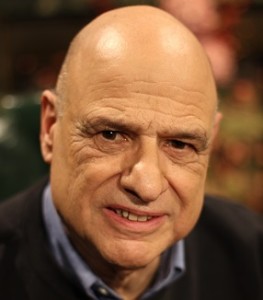A group of Christians often labeled as “progressive evangelicals” will hold a revival — in Lynchburg, Va., a center of conservative Christianity — designed to reconnect that old-time religion with concern and activism for social justice.
Friday and Saturday, the Red Letter Christians movement hosts its first “Red Letter Revival: A Revival of Jesus & Justice” at the E.C. Glass Civic Auditorium.
The idea is to show white conservative Christians — including Jerry Falwell, Jr. at nearby Liberty University — and society that believers can be evangelical and care about the environment, the poor and the immigrant, said Tony Campolo, a sociologist, minister, author and one of the founders of Red Letter Christians.

Tony Campolo
Campolo is one of 15 ministers and activists who will preach during the two-day event. Others include William J. Barber II, Shane Claiborne, Lisa Sharon Harper and Noel Castellanos.
“In the 20th century, the focus was on orthodoxy — making sure theologies were in tune with the theology that came forth from the epistles of Paul,” Campolo said. “But … in addition to having the right theology, it is important to have the right lifestyle — a lifestyle that takes Jesus seriously.”
Campolo spoke with Baptist News Global about the revival and the movement behind it.
When and why was the Red Letter Christian movement created?
It started very in inauspicious manner [in 2007] as a gathering in Washington at the calling of [Sojourners founder] Jim Wallis. The evangelical community had moved into some territory politically that concerned to us. There was a discussion … and we came up with Red Letter Christians, referring to the words of Jesus which were highlighted in red in the New Testament.
How’s the movement going so far?
We have for the last six years been gathering together authors and speakers for a Red Letter fellowship. We meet together for three days and talk about what’s going on, what we are going to say and what we are going to write about. … As evangelicalism moves more and more to the right, it’s safe to say evangelicalism looks more and more like the Tea Party. I don’t think either group would be upset with that comparison. … Jerry Falwell, Jr., [Southern Baptist Trump supporter Robert] Jeffress, Franklin Graham, among them.
And there were some of who were saying this is dangerous. We don’t want Jesus to be defined as a very conservative Republican, nor we do we want Jesus to be defined as very liberal Democrat. I heard a young person say mixing Christianity with partisan politics is like mixing ice cream with horse manure. It’s not going to mess up the horse manure, but it certainly will mess up the ice cream.
Members of the movement have been described as “progressive evangelicals.” Is that fair?
I don’t know whether we like that title. We try to keep away from that title deliberately. That’s why we came up with the title of Red Letter Christians. We want to be people of Jesus. That does have political implications. You can’t go to the New Testament without sensing Jesus’ commitment to the poor. … We basically see ourselves as committed to them. And that list in the 25th chapter of Matthew talks about welcoming the alien. Those aligning with Donald Trump are aligning with an anti-refugee mindset. We feel if we are reading the scriptures honestly, we are to receive the alien. I guess we are progressive in the sense that … we are opposed to the view of women that puts them in a submissive position. We are saying we don’t really buy that. … I can understand why we are called “progressive evangelicals” because we stand over and against the kind of reactionary points of view that are being established by evangelicals across the country.
Is there anything significant about the timing of the revival?
The program has been emerging slowly. We started a few years back with a website and a blog and [Christian activist] Shane Claiborne and I have a radio show we do called “Across the Pond.” … And we have that gathering every December with authors and speakers.
We thought it was time to expand our gathering to a larger audience. We have people coming from 26 different states and Canada and the United Kingdom, and one or two coming from Australia. We see the international character of the movement. Why now? It isn’t that we think that this moment has a specific meaning. It’s that we have been slow getting started.
Why Lynchburg?
It’s the buckle of the Bible Belt. We want to affirm with these brothers and sisters who like Jerry Falwell Jr. and Franklin Graham and Jeffress that we do affirm the doctrines in the Apostles Creed and that the Bible is no ordinary book. … We believe the writers of the scriptures were imbued with the Holy Spirit. … We have a very high view of scripture and of coming into a personal, transformative relationship with Jesus as the basis of salvation. On those beliefs, we are in agreement. But not when it comes to embracing a particular political party. We are saying wait a minute: there is nothing wrong with being a Republican or a Democrat. But if we say Jesus is a Republican or a Democrat, that is idolatry.
Is this really a revival? Will people be asked to make a decision?
Exactly. That is so important. We are going to have a decision time when we will call people forward to kneel and pray to send Jesus and to send the Holy spirit to transform them from within. … But we also want to work hard to overcome the divorce between social justice and old-time evangelicalism. And that’s why we call it a revival.
We see ourselves as heirs to Charles Finney … who was the Billy Graham of the 19th century and who called people down the aisle to accept Christ. … But those who were converted at his meetings were called to be involved in the anti-slavery and women’s suffrage movements. These preachers came to be known as fire brands and they were very instrumental in stirring religious fervor against slavery. … We’re saying when you commit yourself to Christ you commit yourself to what Christ through the Holy Spirit is doing in society today. … We want the values of Jesus to be propagated in the church today.


